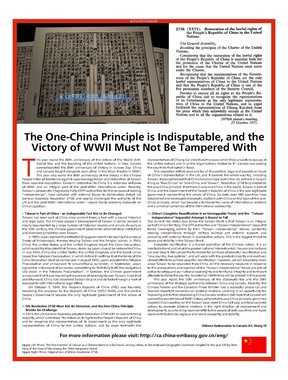China takes out newspaper ads issuing warnings to Canada on Taiwan

The ads, purchased in the Ottawa-based newspaper The Hill Times, consist of op-ed columns written by Chinese Ambassador Wang Di
Article content
OTTAWA — Taiwan’s ambassador to Canada has dismissed a series of full-page newspaper ads taken out by the Chinese Embassy as little more than sabre-rattling over the communist regime’s claims over the east-Asian nation.
Advertisement 2
Article content
The ads were published in The Hill Times — a twice-weekly Ottawa-based newspaper covering the goings-on at Parliament Hill — and clearly draw a bold, red line under China’s position on Taiwan, continuing China’s tendency towards hard-handed “wolf-warrior” diplomacy.
Article content
Article content
“If their position is already the norm of world politics, if they consider the ‘One China Principle’ as universal and accepted by most countries, why on Earth do they need to use this to promulgate it?” Taiwanese Ambassador Harry Tseng told the Toronto Sun.
“Obviously they are perhaps doubtful of what they claim — that the ‘One China Principle’ is a universal principle that every country should abide by.”
Taiwan’s history is complex, beginning when Chiang Kai-shek and his republican government fled the mainland to Taiwan in 1949 at the end of the Chinese civil war.
Article content
Advertisement 3
Article content
In 1971, UN Resolution 2758 recognized the People’s Republic of China as the “only legitimate representative of China to the United Nations,” a move that saw Taiwan kicked out of the UN and its ancillary organizations.

In the decades since, Taiwan emerged as a democratic and free nation, a world leader in high technology and chip making.
But despite holding democratic elections and issuing its own currency and passports, Taiwan exists in a diplomatic no-man’s land — with any nation hoping for diplomatic relationship with the PRC forced to not recognize Taiwanese sovereignty and accept Beijing’s assertion the they are the only “China” in the region.
The first ad appeared in the July 2nd edition of the Hill Times with the headline “The One-China Principle is indisputable, and the victory of WWII must not be tampered with.”
Advertisement 4
Article content
The ad, essentially a paid-for op-ed by China’s ambassador to Canada Wang Di, describes Taiwan as an immutable part of China, promising attempts by “Taiwan separatists” to halt an eventual reunification are bound to fail.
“Complete reunification is a shared aspiration of the Chinese nation,” Wang wrote in the letter.
“It is an inevitable trend and what the greater national interests entail. No one and no force can ever stop it.”

While Wang maintains reunification will be peaceful, he warned the world not to stand in China’s way.
“We will absolutely never allow Taiwan to be separated from China,” the letter continued.
“All necessary measures in response to the provocations and coercion of the ‘Taiwan independence’ forces are acts of justice to safeguard our national sovereignty and territorial integrity and to thwart attempts to divide the country. No external interference will be allowed in this process.”
Advertisement 5
Article content
A second ad, published on July 16, reads more like the usual public relations one would expect from a foreign embassy — with Wang celebrating a recent open house and last month’s Ottawa dragon boat festival.
Recommended video
Ambassador Tseng mused with amusement that his Chinese counterpart must have had extra money to spend on advertising.
“I see no positive effect at all for publishing this,” he said with a smile.
“It’s all the same; it’s been the same for years.”
Ties between China and Canada have grown frosty over the years, particularly following the December 2018 abduction of Canadians Michael Spavor and Michael Kovrig — retaliation for Canada’s lawful detainment of Chinese executive Meng Wanzhou on a U.S. extradition request.
Advertisement 6
Article content
In recent years, China’s stepped up cyberattacks and interference campaigns against Taiwan, with 2.4 million Chinese attacks on Taiwanese networks in 2024.
China is also responsible for sabotaging Taiwanese undersea cables in the disputed Taiwan strait, with four cut cables reported so far this year.
Canada’s has long been a target of Chinese meddling, including intimidation of Canadian politicians like MPs Michael Chong and Kevin Vuongand implicated by Canadian intelligence services of interfering in the 2019 and 2021 federal elections.
China also operated a series of clandestine police detachments within Canada, targeting both Chinese nationals and Canadian citizens for investigation and intimidation campaigns.
Advertisement 7
Article content
Alan Kessel, a senior fellow at the Macdonald-Laurier Institute and a former Canadian diplomat, said the ads were an attempt by Beijing to control the narrative.
“One message implies closer ties, while the other draws a red line around Taiwan, signalling the price of engagement,” he told the Sun, describing the ads as a coordinated attempt to influence Canada’s public and political discourse.
“It’s all about shaping Canada’s policy with respect to Taiwan — one ad projects warmth and a desire to improve relations, while the other is just rigid, ideological red lines over Taiwan, implying that engagement with Canada comes with conditions.”
With Prime Minister Mark Carney replacing predecessor Justin Trudeau, Kessel said Canada needs to pursue a China policy grounded in Canadian values, and not dictated by foreign authoritarian sensitivities.
“That means rejecting coercion, resisting influence operations and affirming that our decisions on Taiwan or any other issue are not shaped in Beijing, but Ottawa.”
bpassifiume@postmedia.com
X: @bryanpassifiume
Read More
-

As Canada’s relationship with China deteriorates, ties to Taiwan grow closer
-

China actively promoting Carney Liberal campaign: Election watchdog
Article content






